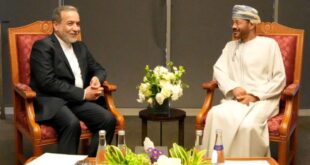 Iran said that it would consider possibility for continuing talks with Washington on Iraq if only US officials extended a relevant request to Tehran through diplomatic channels. US ambassador to Baghdad Ryan Crocker said on Saturday he expected to meet his Iranian counterparts most likely in the next few weeks to discuss Iraq.
Iran said that it would consider possibility for continuing talks with Washington on Iraq if only US officials extended a relevant request to Tehran through diplomatic channels. US ambassador to Baghdad Ryan Crocker said on Saturday he expected to meet his Iranian counterparts most likely in the next few weeks to discuss Iraq.
“The (Iran-US) channel is not dead,” Crocker told reporters on the sidelines of a conference on Iraq in Istanbul, adding, “We expect we would have another round in the not too distant future.”
But Iranian Foreign Ministry Spokesman Seyed Mohammad Ali Hosseini did not confirm the meeting, saying that Tehran should first receive an official request in this regard.
“If the Iraqi side insists and if the American side extends a formal request through diplomatic channels, we will consider it,” Hosseini told reporters during his weekly press conference here on Monday.
Both sides have stressed that the talks would focus strictly on Iraq’s insecurity problem and would not touch on Tehran-Washington relations or Iran’s nuclear issue.
The two sides have already had three meetings, and Crocker said that during the last round of talks the Iranian delegation had proposed that coalition forces should be withdrawn from Iraq and a consortium of other states, such as Iran and Syria, should oversee Iraq’s future development.
Elsewhere, Hosseini pointed to ongoing crisis at Turkey-Iraq borders, and said Tehran wanted a peaceful end to Turkey’s stand-off with rebel Kurds in northern Iraq.
“We do emphasize the fact that a peaceful and diplomatic solution should be pursued in this regard,” he said.
“We do believe that security talks between the (neighboring) countries can also have a positive effect in finding a solution to this problem,” he said, commenting on a meeting of Iraq’s neighbors in Istanbul on Saturday.
Hosseini said the United States also appeared to be providing backing to Kurdish rebels, citing reports of US weaponry found at their bases and meetings between US officials and leaders from the groups.
“It is the Americans who should not provide a chance for the terrorist groups to launch attacks against neighboring countries,” Hosseini said.
The Kurdish Workers Party (PKK), a Kurdish separatist movement that is fighting Turkey, has an Iranian offshoot called the Party of Free Life of Kurdistan (PJAK).
Turkey has massed troops and equipment on the border with northern Iraq, from where Kurdish rebels are mounting attacks into Turkey. Iran has also been attacked several times this year by Kurdish rebels on its border with Iraq.
Iraq previously said Iran had expressed its desire for a peaceful solution when Iranian President Mahmoud Ahmadinejad spoke with his Iraqi counterpart Jalal Talabani. Baghdad said they agreed military action was not the “sole option”.
Meantime, Hosseini reminded the Untied States’ responsibility as an occupying state, and took US troops responsible for establishing security and stability in Iraq.
Elsewhere, the foreign ministry spokesman responded to questions about a recent proposal made by Saudi Arabia for the establishment of a nuclear consortium in a country outside the region to enrich uranium for Iran and other regional states, and reminded that the idea was originally presented by his own country.
He said President Mahmoud Ahmadinejad had first raised the offer during a general assembly meeting of the United Nations two years ago, adding that the invitation is still in place.
“We consider and welcome all plans guaranteeing Iran’s nuclear and enrichment rights,” Hosseini continued.
Asked if Iran would continue cooperation with the International Atomic Energy Agency in case the UN Security Council passed a third resolution for imposing a set of fresh sanctions on the Islamic Republic, Hosseini said, “We will go on with the modality (action) plan that we and the IAEA have compiled before.”
“But in case a new resolution is passed, we will adopt the necessary stances and decisions,” he added.
 Eurasia Press & News
Eurasia Press & News



